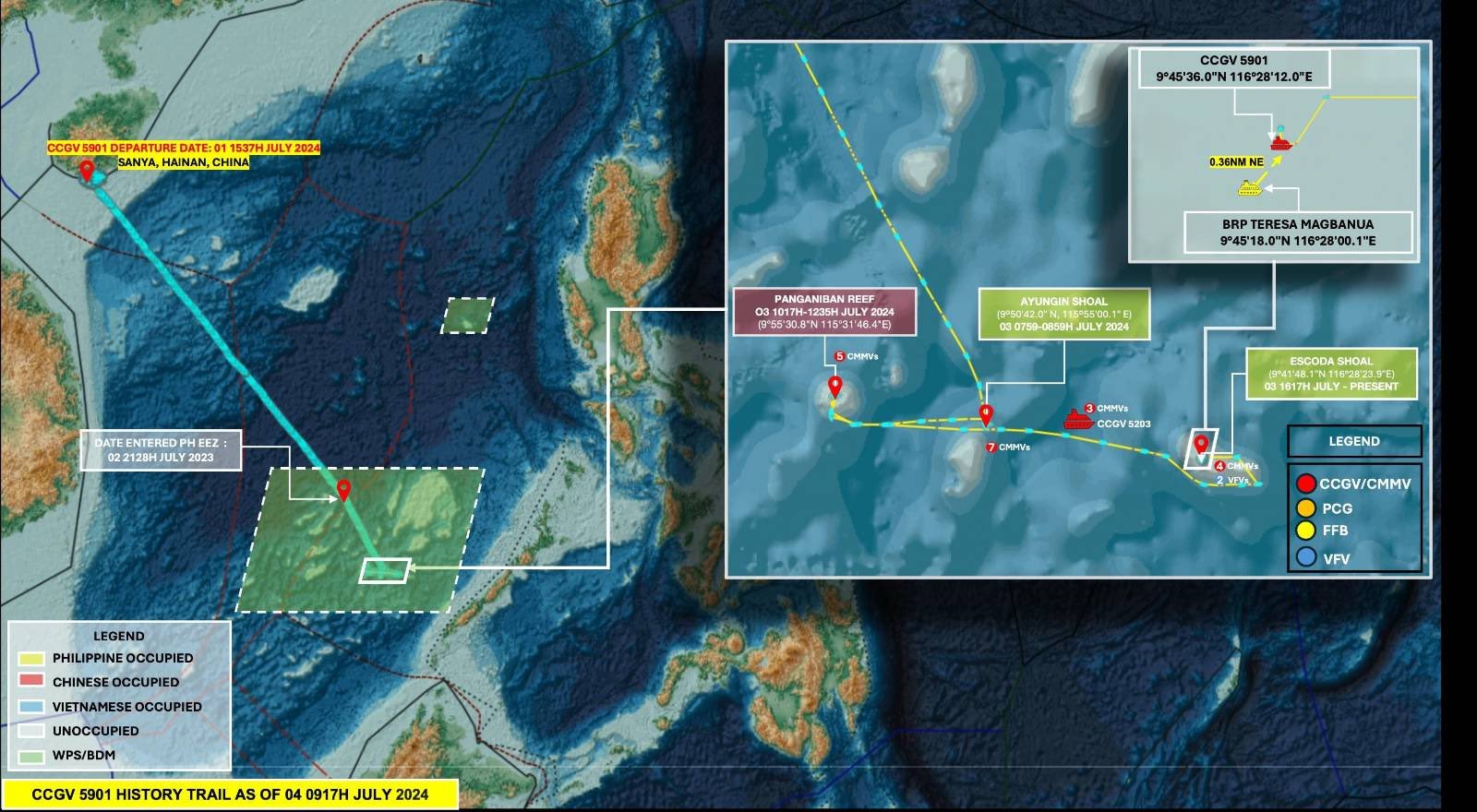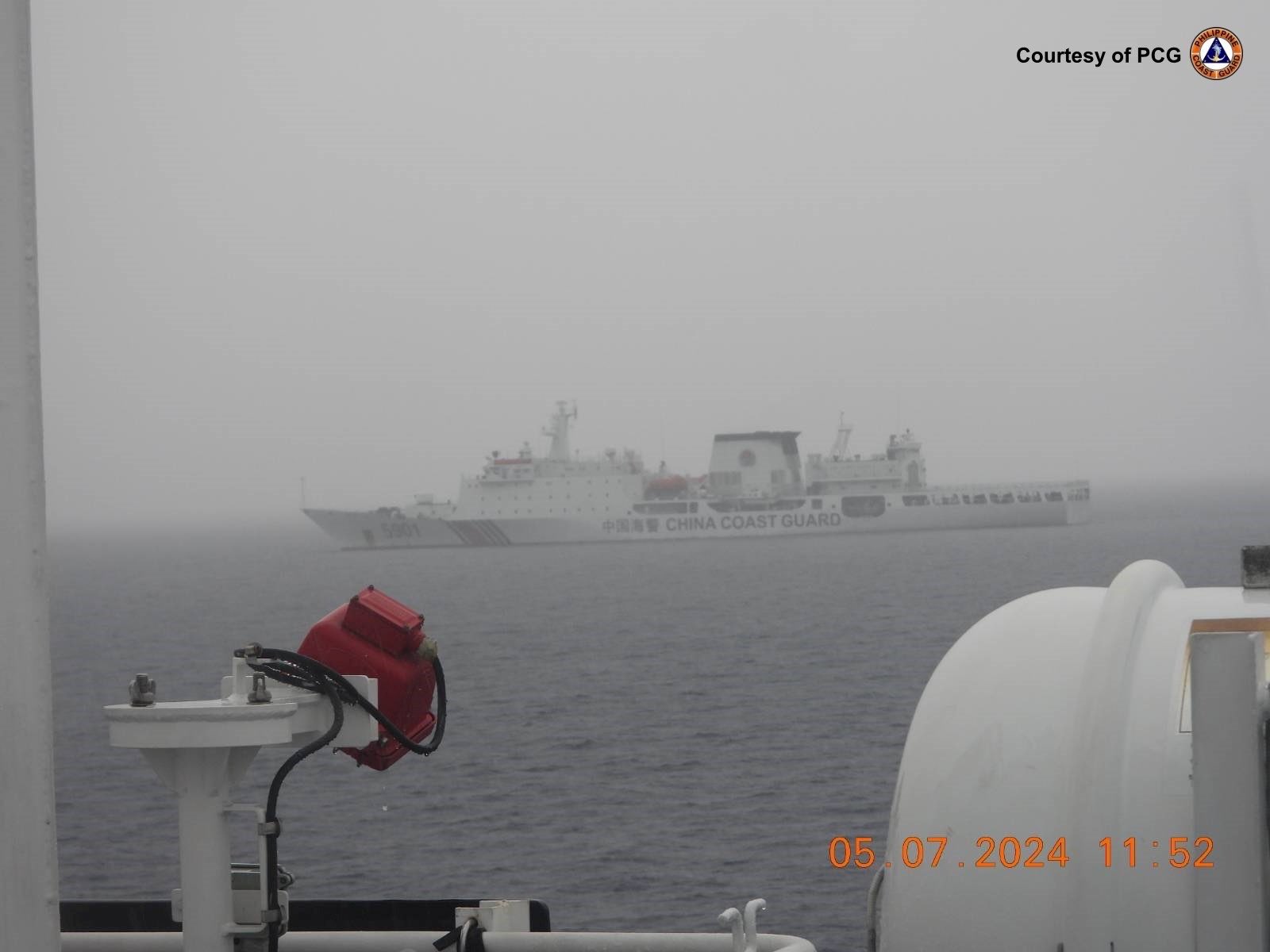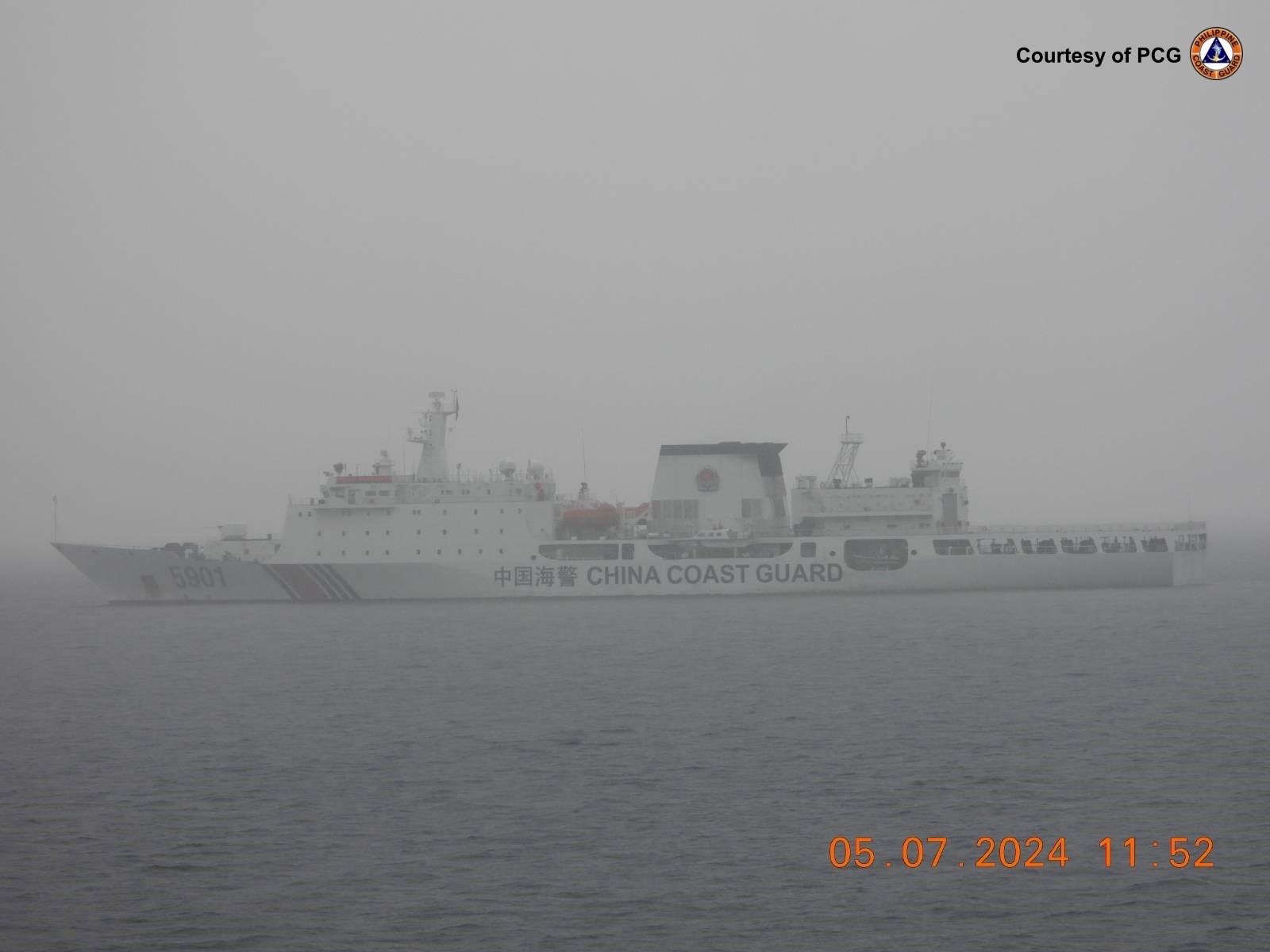In a move described by a Philippine official as an act of “intimidation,” China has recently anchored its “monster” coast guard vessels within the Philippines’ exclusive economic zone (EEZ), intensifying the ongoing territorial dispute in the South China Sea.
Philippine Coast Guard spokesperson Jay Tarriela said that the China Coast Guard vessel CCG-5901 was anchored near Sabina Shoal in the Spratly Islands, approximately 130 kilometers northwest of the Philippine island of Palawan, on July 3 and was still there on July 6.
The Philippine Coast Guard promptly warned the Chinese vessel and inquired about its intentions. Tarriela emphasized that the Philippines would not retreat from its claims in the South China Sea.
“It’s an intimidation on the part of the China Coast Guard,” Tarriela asserted. “We’re not going to pull out, and we’re not going to be intimidated.”
In response to the Philippine claims, China’s Ministry of Foreign Affairs, during a regular press briefing, denied that the area in question was part of the Philippines’ EEZ.

Spokesperson Lin Jian stated, “China’s military and police ships patrolling and enforcing the law in the waters near Xianbin Jiao comply with China’s domestic law and international law.” The spokesperson used the Chinese name for the Sabina Shoal.
China maintains its claim of “indisputable sovereignty” over nearly the entire South China Sea, including many features located hundreds of miles from mainland China. This broad claim has led to conflicting assertions from multiple governments, including the Philippines.
A landmark 2016 ruling by an international tribunal in The Hague favored the Philippines. It declared that China had no legal basis to claim historic rights to the bulk of the South China Sea.
However, Beijing has disregarded this ruling, continuing to assert its territorial claims through various means, including the deployment of its coast guard and militia boats.
Over the past year, China Coast Guard ships, often reinforced by militia boats, have been involved in numerous clashes that have resulted in damage to Philippine vessels and injuries to Filipino sailors.
Beijing’s colossal coast guard ship frequently plays a key role in advancing China’s territorial ambitions. Last year, the CCG-5901 vessel was deployed near Vanguard Bank, a known flashpoint between Vietnam and China, where Vietnam has significant oil and gas fields.
How Large Is China’s Monster Coast Guard Ship?
China’s enormous coast guard vessels, recognized for their impressive size, play a pivotal role in Beijing’s strategy to assert its expansive maritime claims through patrols and intimidation. China operates two such formidable vessels, which have significantly outstripped previous records in size and capability.
At 541 feet in length and displacing 12,000 tons, the Chinese Coast Guard vessels dwarf most Coast Guard vessels globally, including those of the United States. Their size and capabilities have led many observers to dub them “The Monster.”
Previously, Japan’s Shikishima class was the world’s largest coast guard vessel until it was surpassed by Chinese ships in 2015.
The Chinese Coast Guard’s monster vessel, with its substantial displacement, is three times the size of the US Coast Guard’s primary patrol vessels, the National Security Cutters. The vessel is also larger than US Navy destroyers.
The vessel’s dimensions exceed those of the US Navy’s Ticonderoga-class cruisers and Arleigh Burke-class destroyers, with the latter displacing 9,700 tons or less and being about 35 feet shorter than the Chinese cutter.

As for firepower, the Chinese Coast Guard ship also outmatches the US cutters. It is equipped with two 76.2-millimeter guns, while US vessels have a single 57-millimeter gun.
The cutter’s firepower advantage is matched by its size, which significantly surpasses that of the US Coast Guard’s National Security Cutters, which displace only 4,500 tons, roughly a third of the cutter’s size.
Meanwhile, the BRP Teresa Magbanua, the largest vessel in the Philippine Coast Guard fleet, also remains stationed at Escoda (Sabina) Shoal alongside the Chinese CCG-5901.

Teresa Magbanua has been deployed to Escoda Shoal since April, responding to the presence of Chinese maritime militias and suspected reclamation activities.
The Teresa Magbanua, measuring 97 meters, is the Philippine Coast Guard’s flagship vessel and its most advanced and costly asset. However, it is dwarfed by the Chinese CCG-5901, which is more than five times its size.
🇵🇭SABINA (ESCODA) SHOAL🇵🇭
0.5m📷 from 7 July 2024 give a clear view of CCG 5901 at anchor ~706m from BRP Teresa Magbanua who has maintained a presence at Sabina Shoal, in the🇵🇭EEZ of the Philippines since April 18th https://t.co/9iD3mmeYeH pic.twitter.com/Du7izHLqZW— MT Anderson (@MT_Anderson) July 8, 2024
Philippine Coast Guard officials have said that the Teresa Magbanua will remain stationed at Escoda Shoal to ensure its patrols continue, dismissing Chinese claims that the vessel could be considered a permanent outpost similar to the Sierra Madre.
PCG spokesperson Jay Tarriela clarified that while the Teresa Magbanua is crucial to their operations, it is not intended as a permanent fixture but rather as a patrol vessel ensuring the security of Philippine waters against ongoing Chinese activities.
- Contact the author at ashishmichel(at)gmail.com
- Follow EurAsian Times on Google News




